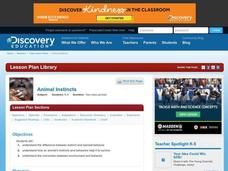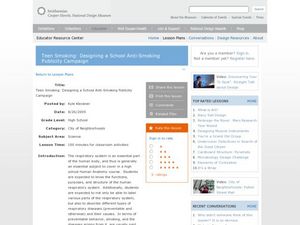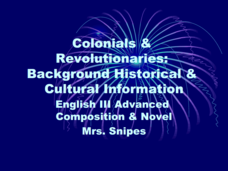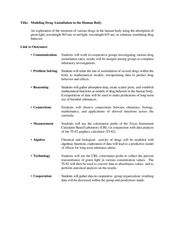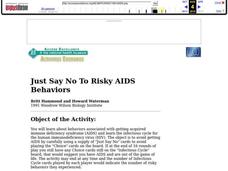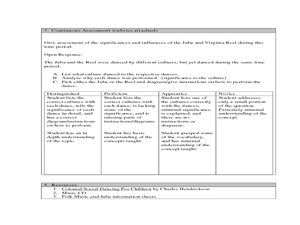Curated OER
Terrible Things
Students reflect on the Holocaust in two lessons. Using prior knowledge, they investigate and make decisions dealing with human behavior before beginning their studies on the Holocaust. After examining different aspects of the event,...
Curated OER
Picturing People
Young scholars look at the varied ways the human body is portrayed in contemporary media. They discuss what a character is and how it plays a role in telling stories. Students look at examples of objects like dolls, puppets and toys...
Curated OER
Build an Oxygen Plant
Students create models of an oxygen-delivery system and relate it to the function of the human circulatory system.
Vanderbilt University
Healthy Bodies for Boys
Create an inclusive space for scholars to gain milestone information about their growing bodies with a unit designed to meet the needs of learners with disabilities. Topics include the onset of puberty, hormones, hygiene, and more!
Baylor College
Food for Kids
Immediately capture the attention of your class with the smell of freshly popped popcorn in the sixth lesson of this series on the needs of living things. Young scientists first use their senses to make and record observations of...
K20 LEARN
Water We Going To Do? Floodplains And Watershed Management
How has human activity affected Earth's watersheds? An action-packed lesson plan, part of the K20 Center, examines water's ability to go with the flow regardless of what is in its path. Scholars build model watersheds, examine time-lapse...
Curated OER
Animal Instincts
Students compare animal adaptations to human behavior. For this science lesson, students discuss animal instincts vs. learned behavior. Options for student writing, drawing and research are incorporated into this lesson plan
Curated OER
The Value of Behavioral Variation in Homo sapiens
Young scholars look at the behavioral characteristics of their peers from a historical perspective, and realize that, in the larger scheme of a community, these behaviors do have some value, and that a society as complex as ours does...
Curated OER
Your Genes: Your Future
Students examine different healthy behaviors and choose one of their own that they would like to change or improve. In this healthy lesson students write a letter to themselves that they are going to make a change and why it is...
Curated OER
Teen Smoking: Designing a School Anti-Smoking Publicity Campaign
Students review the human respiratory system and the effects on the human body. In this design lesson students brainstorm and create a prototype then present it to the class.
Curated OER
How Does the Loss of Ozone Affect Our Climate
Students explore the greenhouse effect and what it does to the environment. They discuss if and how human behavior contributes to global warming and test natural materials for carbon content.
Curated OER
Instinct vs. Learned Behavior
Fifth graders engage in a discussion about learned vs. instinctive behaviors. They list of behaviors on the board with the help of Students. They go back through the list and use two symbols, one for instinctive and one for learned.
University of North Carolina
Psychology
Psychology, the scientific study of the human mind and behavior, is a popular major for many college students. An informative handout outlines common assignments in psychology courses. Scholars see how to design a research proposal,...
Scholastic
Study Jams! Heredity
Mia wishes her blue hair was inherited so that she wouldn't have to dye it, but Sam explains that eye color is. The video does not expound upon the concept of alleles. It does, however, describe inherited traits vs. learned behavior, and...
Curated OER
Colonials & Revolutionaries: Background Historical & Cultural Information
The four major trends of the 18th century (The Enlightenment, the Great Awakening, British global ambitions, and economic disagreements) are the focus of a PowerPoint that places in context such influences as deism, mercantilism,...
Curated OER
Modeling Drug Assimilation in the Human Body
Pupils investigate the accumulation of drugs in the body. In this algebra lesson, students collect data on drug retention and assimilation. They use their data to predict the behavior and effects of drugs.
Curated OER
Just Say No To Risky Aids Behaviors
Learners discover the behaviors associated with getting acquired immune deficiency syndrome (AIDS) and study the infectious cycle for the human immunodeficiency virus (HIV) by playing a board game. They play in small groups.
Curated OER
Alas, All Human
Students define a scientist. In this ethics and science lesson, students read Asimov's Alas, All Human and write responses and discuss the possibilities of imperfection within science by scientists. Students discuss what steps should be...
Curated OER
Human Needs
Students investigate human needs and how they have adapted to different environments. They complete an experiment to discover the effect of stress on muscles. They use the food pyramid to create a plan for healthy eating.
Curated OER
Humanities in Colonial and Revolutionary America
Students demonstrate dances of colonial America. In this colonial American lesson, students learn forms of colonial social dancing including the Juba and Virginia Reel. Students examine the history of the 2 dances as well.
Curated OER
Physiology Activity Perception and Behavior
Students conduct an experiment to determine a fly's ability to detect sugar, its behavioral response, how a previous experience may alter the response, if a fly can be tricked, and how human sensitivity compares to a fly.
Anti-Bullying Alliance
Anti-Bullying Lesson Plan
Wicked is not just a Tony Award winning broadway musical. It also makes for a strong base to teach character education, specifically anti-bullying. Scholars listen, discuss, role play, and show what they know through a group presentation...
Council for the Curriculum, Examinations and Assessment
Feelings and Emotions
The focus of the second in a 10-session course on Social, Physical, Emotional, Cognitive and Spiritual (SPECS) health is on learning to express and manage feelings appropriately. Class members learn different ways of identifying, coping...
College Board
1999 AP® Psychology Free-Response Questions
The interplay between biology and psychology is a complicated one. Learners explore the connection using free-response questions from an administered AP® exam. Scholars also ponder how bias helps people remember what they see.
Other popular searches
- Human Behavior Steps
- Activities Human Behavior
- Human Behavior Lab
- Human Behavior and Instincts
- Understanding Human Behavior
- Seasons Human Behavior
- Human Behavior Theorists
- Genetics and Human Behavior
- Human Behavioral Patterns








